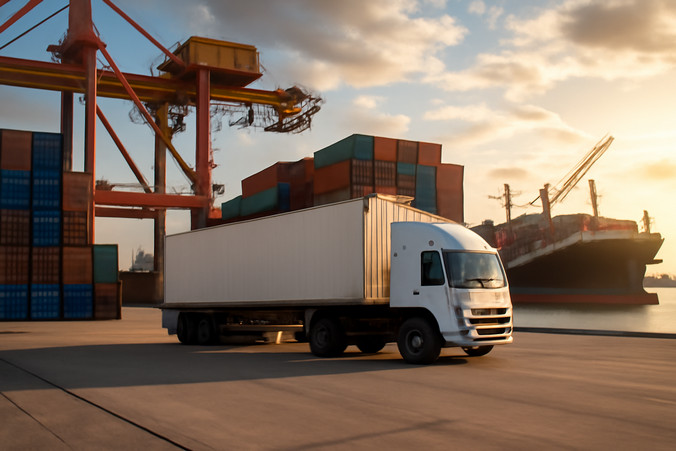In the world of logistics, efficiency and control are crucial to maintaining a smooth operation.…

Optimization of import logistics for high-volume manufacturing companies
Reading Time: 3 minutes
In the competitive environment of the manufacturing industry, import logistics optimization has become a key factor to ensure efficiency, cost reduction, and speed in the delivery of raw materials and finished products.
For manufacturing companies handling high volumes of products, optimizing this area can represent a significant strategic advantage over the competition.
Below, we will discuss the importance of optimizing import logistics for industrial companies.
🚢What is import logistics in manufacturing?
Import logistics in manufacturing refers to the set of processes, activities, and operations that enable the efficient and timely entry of raw materials, components, and finished goods from abroad into production facilities.
This process includes managing international transportation, customs procedures, warehousing, internal distribution, and coordination with suppliers and logistics agents.
For manufacturing companies, having efficient import logistics is essential, as it directly affects production continuity, inventory control, and the ability to meet delivery deadlines agreed upon with clients.
Furthermore, manufacturing high volumes of products adds a considerable level of complexity, as it requires precise coordination to handle large quantities of raw materials and finished goods without causing bottlenecks, minimizing the risk of production line stoppages, and optimizing the use of space and resources available in warehouses and transportation.
This complexity demands robust and flexible logistics solutions that can adapt to demand fluctuations and guarantee a steady and orderly flow throughout the supply chain.
The importance of import logistics in manufacturing
The supply chain of a manufacturing company largely depends on the continuous and efficient flow of raw materials, components, and finished products, which are often imported from various countries. A slow or inefficient logistics process not only affects production times but also increases operating costs, causes delivery delays, and can impact final customer satisfaction.
⏳How to reduce time and costs in import logistics
To optimize import logistics, it is essential to adopt solutions designed specifically for each company’s needs and volume. Some key strategies and recommendations include:
- Comprehensive analysis and planning
Thoroughly evaluating current import processes helps identify bottlenecks, idle times, and areas with unnecessary costs. An initial diagnosis supports designing a customized and realistic logistics strategy aligned with the company’s objectives. - Use of advanced technologies
Implementing logistics management software (TMS, WMS, ERP) that integrates and automates the traceability of shipments, inventories, and customs documentation is vital to improve real-time visibility and control. This facilitates timely decision-making and reduces human errors. - Cross-docking and cargo consolidation services
For companies with high volume, cross-docking reduces unnecessary storage by transferring goods directly from arrival to distribution. Likewise, consolidating cargo optimizes space, lowers transportation costs, and speeds up dispatch processes. - Partnerships with specialized customs brokers
Having expert advice on customs regulations and compliance ensures agile clearance in accordance with the law, avoiding fines, seizures, or delays due to non-compliance. - Strategic warehousing and kitting
Locating warehouses near key points such as ports or borders and applying kitting services allows for more agile and flexible product management, improving delivery times and reducing unnecessary movements. - Optimization of transportation and routes
Planning routes and transport modes that minimize time and costs, leveraging multimodal options (land, sea, air) according to the cargo profile and urgency.
Additional recommendations to optimize import logistics processes
- 📄 Automate documentation. Digitizing and automating import procedures reduces errors and speeds up customs approvals.
- 🎓 Continuous training. Educating staff on regulations, processes, and technology use ensures efficiency and compliance.
- 📡 Constant monitoring. Using real-time tracking systems to anticipate deviations and take preventive actions.
- 🔍 Evaluation and continuous improvement. Regularly reviewing logistics performance indicators to identify improvement opportunities.
- ⚙️ Operational flexibility. Adapting logistics to changes in demand, volume, or market conditions to maintain competitiveness.
Trust American Industries Río Bravo
Optimizing import logistics for manufacturing companies with high product volumes is a strategic investment that directly impacts productivity, costs, and customer satisfaction. Implementing tailored solutions supported by technology and expert advice allows for reduced lead times, minimized expenses, and maintaining an agile and reliable supply chain.
Do you want to optimize your manufacturing company’s import logistics to reduce time and costs? At AI Río Bravo, we offer customized solutions in warehousing, cross-docking, kitting, end-to-end software management, and customs brokerage designed for companies with high product volume.
Discover how we can help you improve your supply chain efficiency and boost your productivity.
Contact us today and take your logistics to the next level.



